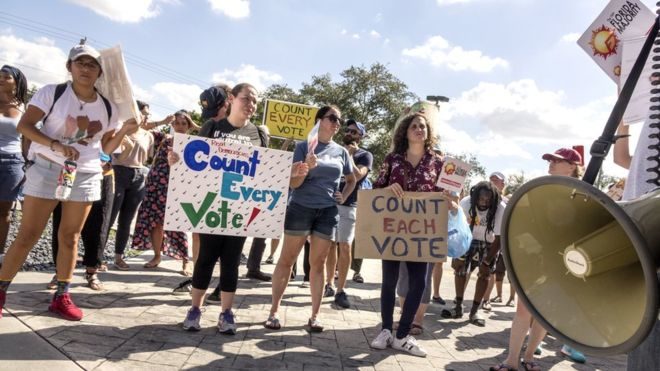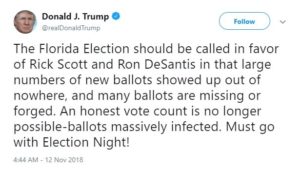Trump, Rick Scott and Republicans Want to Call the Election Because They Are Winning
It turns out that Americans have no patience.
Actually, we know this: Television audiences expect resolution of all dramas in under an hour, you can’t go to a ball game without seeing people streaming out before the end of the game, and, as we are learning again, we can’t stand waiting more than a couple of hours to get the results on election day.
So, we might expect that Trump and—in this case, the Republican leaders in Florida—want to call the game halfway through the ninth inning. The legally required machine recount of nine million votes—which may actually force a hand recount—is going on too long for them.
Maybe someone should just explain to them that double-overtime games are more exciting.
They have not come up with any evidence of voter fraud, and state officials who have looked have not found any.
But when you enter the game, you agree to take on the rules of that game—the foul lines, the number of players allowed, the number of innings played. These people all agreed by entering the race to accept its outcome—and its rules.
Still, normally, I might just take note of what we’re seeing in Florida, sigh and move on.
But now Trump and Rick Scott, the Republican Florida governor who holds a lead in the race for Senate against incumbent Bill Nelson, want to call the game before two populous, but traditionally Democratic-leaning counties, finish counting their votes. On its face, it seems wrong.
The contest to succeed Scott as governor has Republican Ron DeSantis ahead of Democrat Andrew Gillum—who, in what looks in retrospect to seem quaint, actually had conceded on election night, based on the numeric information about outstanding votes that he had at the time. A third race for state agriculture director also is caught up in a recount. Florida law requires a machine recount in tight races, and, if the votes are especially close, a hand recount.
For its part, Broward and Palm Beach counties, however, have had several false hopes of closing out their vote but keep finding uncounted votes or administrative mismanagement of about two dozen ballots, or they say that they have other related stacked deadlines for ballots yet not received. Votes from military, for example, can be filed through Friday, for example. Provisional ballots apparently arrived in no particular order.
A teacher in Broward County had discovered a box labeled “provisional ballots,” left behind at the polling place at her school, but it turned out to be supplies, according to The New York Times. In Broward County, 22 rejected ballots were mixed in with about 180 valid ones and were counted. In Palm Beach County, damaged ballots that were duplicated by hand, as required under state law, were handled without independent observers having a good vantage point to witness the process. Staff members had made rulings themselves on questionable ballots that were supposed to be judged by a three-person panel. Others have blamed a poorly designed ballot to explain why there are 26,000 more votes for governor than for Senate.
Trump and Scott have decided the reason is widespread voter fraud being committed by the two county supervisors and have filed suit to stop the recounts. They just want to win now.
They have not come up with any evidence of voter fraud, and state officials who have looked have not found any.
Now, before this goes any further, no one is a shining angel in this mess. You might think that Florida vote administrators would know how many people voted and how many ballots they have. Or they would have the dates for absentees aligned with the election results. Or they would have vote-counting machines that could accurately record the submitted votes.
But frankly, in all the stories that I have examined, no one actually understands why the Florida officials don’t know.
The least that we should be able to do is to make the process transparent.
Of course, the least that we should be able to expect from the President of the United States is to assure the country’s voters that their vote matters and must be counted. After all, this is the same president who is basically a person of interest in an investigation about whether Russians interfered in the last election.
Instead, the value Trump pursues is winning. His candidate must win. Now. If not, the other guy must be cheating. This seems to be true even if Trump were not to win, as in the overall results from last Tuesday’s election. In the retelling the next day, Trump heaped huge praise on himself for winning virtually any and all elections he blessed with his participation.
The process to resolve a parallel close election for senator in Arizona seemed far more civilized. No one was shouting fraud, and the governor was actually urging calm. In Georgia, the contentiousness between Democrat Stacey Abrams and Republican Brian Kemp, who actually has been the secretary of state overseeing elections, has been simmering for months as Kemp moved to block tens of thousands of voters—70% of them non-white. So, delaying the count there is a mere extension of the conflicts already in place.
I’m ready for a good voter fraud case; we’ve been talking about a widespread conspiracy since the Trump campaign, and the appointment of that failed national fraud commission headed by Kris Kobach. A healthy fraud case might finally start to boil off some of the ill feelings, and, besides might be a sign that Democrats, in this case, are well-enough organized to bring it off, which would come as its own surprise.
Instead, what I fear we have is very close races, a continuing reflection of the divide in the country. If our candidates can win convincingly, we apparently have no fraud.
Calling fraud with no evidence and demanding an end of the game before its end seems a bad idea all around. It’s worse if you have no patience for the game to be played.






